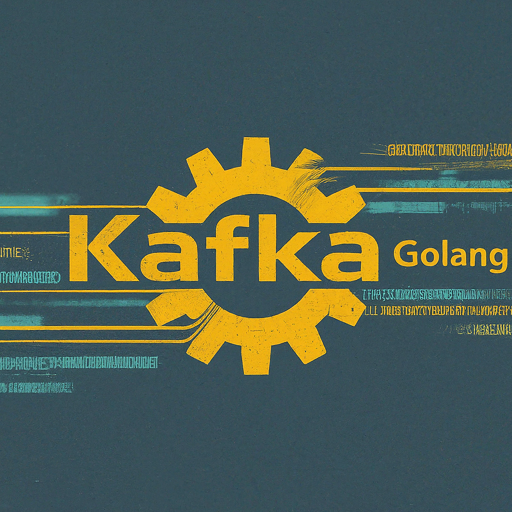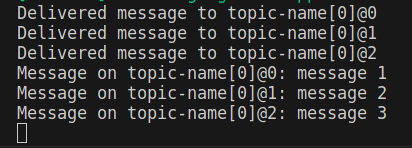
If you need to know the basics of Kafka, such as its key features, components, and advantages, I have an article covering that here. Please review it and follow the steps until you've completed the Kafka installation using Docker to proceed with the following sections.

Similar to the example in the article about connecting Kafka with NodeJS, this source code also includes two parts: initializing a producer to send messages to Kafka and using a consumer to subscribe to messages from a topic.
I'll break down the code into smaller parts for better understanding. First, let's define the variable values.
package main import ( "fmt" "github.com/confluentinc/confluent-kafka-go/kafka" ) var ( broker = "localhost:9092" groupId = "group-id" topic = "topic-name" )
- Here, the package github.com/confluentinc/confluent-kafka-go/kafka is used to connect to Kafka.
- The broker is the host address; if you are using ZooKeeper, replace the host address accordingly.
- The groupId and topic can be changed as needed.
Next is initializing the producer.
func startProducer() {
p, err := kafka.NewProducer(&kafka.ConfigMap{"bootstrap.servers": broker})
if err != nil {
panic(err)
}
go func() {
for e := range p.Events() {
switch ev := e.(type) {
case *kafka.Message:
if ev.TopicPartition.Error != nil {
fmt.Printf("Delivery failed: %v\n", ev.TopicPartition)
} else {
fmt.Printf("Delivered message to %v\n", ev.TopicPartition)
}
}
}
}()
for _, word := range []string{"message 1", "message 2", "message 3"} {
p.Produce(&kafka.Message{
TopicPartition: kafka.TopicPartition{Topic: &topic, Partition: kafka.PartitionAny},
Value: []byte(word),
}, nil)
}
}
The above code is used to send an array of messages {"message 1", "message 2", "message 3"} to a topic and uses a go-routine to iterate through events with for e := range p.Events() and print out the delivery result, whether it's a success or failure.
Next is creating a consumer to subscribe to the topic and receive messages.
func startConsumer() {
c, err := kafka.NewConsumer(&kafka.ConfigMap{
"bootstrap.servers": broker,
"group.id": groupId,
"auto.offset.reset": "earliest",
})
if err != nil {
panic(err)
}
c.Subscribe(topic, nil)
for {
msg, err := c.ReadMessage(-1)
if err == nil {
fmt.Printf("Message on %s: %s\n", msg.TopicPartition, string(msg.Value))
} else {
fmt.Printf("Consumer error: %v (%v)\n", err, msg)
break
}
}
c.Close()
}
Finally, since this is a simple example, call the functions to create the producer and consumer for use. In a real-world scenario, the deployment of the producer and consumer is typically done on two different servers in a microservices system.
func main() {
startProducer()
startConsumer()
}

Happy coding!
If you found this content helpful, please visit the original article on my blog to support the author and explore more interesting content.





Some series you might find interesting:
The above is the detailed content of Connect Kafka with Golang. For more information, please follow other related articles on the PHP Chinese website!
 The difference between gateway and router
The difference between gateway and router
 How to recover files emptied from Recycle Bin
How to recover files emptied from Recycle Bin
 How to fix libcurl.dll missing from your computer
How to fix libcurl.dll missing from your computer
 Delete exif information
Delete exif information
 WiFi shows no access to the Internet
WiFi shows no access to the Internet
 My computer can't open it by double-clicking it.
My computer can't open it by double-clicking it.
 How to restore friends after being blocked on TikTok
How to restore friends after being blocked on TikTok
 Introduction to javascript special effects code
Introduction to javascript special effects code




